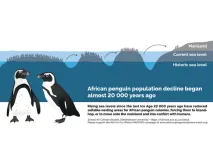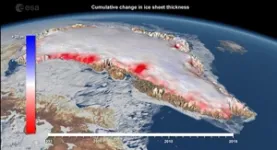(Press-News.org) Imagine the view from the western coastline of southern Africa during the Last Glacial Maximum (LGM) over twenty thousand years ago: in the distance you would see at least fifteen large islands – the largest 300 square kilometres in area – swarming with hundreds of millions of marine birds and penguin colonies.
Now imagine sea levels rising up to a hundred metres between fifteen to seven thousand years ago, gradually covering these large islands until only small hill tops and outcrops remained above water. Over the past 22 000 years this resulted in a tenfold reduction in suitable nesting habitat for African penguins, sending their population numbers into steep decline.
This is the paleo-historical picture of the geographical range of African penguins, created by scientists in the evolutionary genomics research group in the Department of Botany and Zoology and the School for Climate Studies at Stellenbosch University (SU). With this effort, they hope to provide new insight into the current vulnerability of the last remaining penguin species in Africa.
The study, titled “A natural terminal Pleistocene decline of African penguin populations enhances their anthropogenic extinction risk” was published in the African Journal of Marine Science on 20 April 2023.
Dr Heath Beckett, first author of the article and postdoctoral fellow at SU’s School for Climate Studies, says this paleo-historical image of multiple millions stands in stark contrast to the current reality of a post-1900 collapse of the African penguin population.
In 1910, Dassen Island (an island off the West Coast, about three square kilometres in area) was teeming with an estimated 1.45 million penguins. However, by 2011 South Africa’s entire African penguin population collapsed to 21 000 breeding pairs, and by 2019 they further declined to only 13 600. Approximately 97% of the current population in South Africa is supported by only seven breeding colonies.
In May 2005 the International Union for the Conservation of Nature classified the African penguin as endangered.
Paleo-historical estimates of penguin population sizes
So how did the southern and western coastlines of southern Africa look like during the last Ice Age? And what can it tell us about penguin population numbers?
As penguins prefer to breed on islands to escape mainland predators, the researchers used topographic maps of the ocean floor off the coast of southern Africa to identify potential historical islands lying at ten to 130 metres below current sea levels.
For islands to qualify as suitable for penguins they needed to offer protection from land-based predators and had to be surrounded by suitable foraging grounds for sardine and anchovy within a 20 kilometre radius.
Assuming that sea levels were much lower during the last Ice Age, they identified 15 large islands off the West Coast, the largest a 300 km2 island lying 130 metres below the sea surface. Then taking into account rising sea levels over the past 15 000 to 7 000 years, they identified 220 islands which would have provided suitable nesting conditions for penguins, of which 216 are less than one km2 in area, while some are as small as 30 m2, barely more than a rock.
Today the five largest islands off the West Coast of Southern Africa are Robben Island (~5 km2), Dassen Island (~3 km2), Possession Island (~ 1.8 km2) and Seal Island and Penguin Island (both below 1 km2). Possession, Seal and Penguin Island are all off the coast of Namibia.
Based on the earliest available population density estimates, they then calculated penguin population estimates based on available island area, assuming that penguins usually nest at most 500 metres from the shore.
Following this approach, they estimate that between 6.4 million and 18.8 million individuals could have occupied the southern Cape waters during the Last Glacial Maximum. Due to rising sea levels, however, 15 000 to seven thousand years ago, the habitat for the African penguins to nest on, went into a steep decline.
According to Dr Beckett, the main objective of the study is to show that there have been major changes in habitat availability over the last 22 000 years: “This could have had a massive effect on penguin populations. These populations are now experiencing additional human pressures on top of this in the form of climate change, habitat destruction and competition for food,” he explains.
Implications for conservation management
While this finding raises grave concerns, the researchers argue that it also highlights the potential for a reserve of resilience in African penguins that may be leveraged for its conservation and management in an uncertain future.
Dr Beckett explains: “Changing sea levels would have necessitated the need for multiple relocations of breeding colonies of African penguins on time-scales of centuries, if not even shorter time-scales, and intense competition for breeding space as island habitat became greatly reduced in size. This historical flexibility of response provides some leeway for conservation managers to make available suitable breeding space, even in mainland sites, as long as appropriate nesting sites are made available”.
According to Prof. Guy Midgley, interim director of SU’s School for Climate Studies and a co-author, this millennial-scale set of selection pressures would have favoured strong colonisation ability in the species: “It’s a total survivor and given half a chance, they will hang on. Island hopping saved it in the past, they know how to do this,” he emphasised.
But even given the chance of relocation, how much more will it take to persist given the rise of modern human pressures? When competing against the commercial fishing industry and humanity in general for the same food source, penguins – and other marine life – may not stand a chance.
Therefore, “for any relocation measures to be successful,” they warn, “sufficient access to marine food resources remain a vital element of a coordinated response to prevent extinction of the species”.
END
African penguins: climate refugees from a distant past?
A new study on the paleo-historical geographic range of the endangered African penguin since the last Ice Age paints a grave picture of a species in steep decline
2023-04-20
ELSE PRESS RELEASES FROM THIS DATE:
New study challenges the idea that early Parkinson’s Disease causes cognitive dysfunction
2023-04-19
Like many neurodegenerative diseases, Parkinson’s disease (PD) is a thief that hacks into human operating systems and corrupts their cognitive hard drives until they can no longer control their movements or perform activities of daily living.
Often, in its later stages, Parkinson’s disease steals data too, leading to memory loss, confusion and dementia.
Both the cause and cure of Parkinson’s disease remain elusive, but research has helped afflicted individuals manage their symptoms and lead healthier post-diagnosis lives. Individuals diagnosed with Parkinson’s ...
Fighting a national nursing faculty shortage
2023-04-19
Last year, nursing schools across the country were forced to turn away more than 90,000 qualified applicants. The reason: a lack of faculty members to teach them and clinical sites to train them.
A team of University of Texas at Arlington faculty led by Ann Eckhardt, clinical associate professor and interim chair of graduate nursing programs in the College of Nursing and Health Innovation (CONHI), received a state grant to help reverse that trend and increase the pool of nursing faculty, preceptors and simulation coordinators.
“There ...
Clinical trial begins using CAR T cells to potentially cure HIV
2023-04-19
UC Davis Health researchers have dosed the second participant in their clinical trial looking to identify a potential cure for HIV utilizing CAR T-cell therapy. The novel study uses immunotherapy. It involves taking a patient's own white blood cells, called T-cells, and modifying them so they can identify and target HIV cells to control the virus without medication.
The first participant was dosed with anti-HIV duoCAR T cells at UC Davis Medical Center in mid-August. The trial is the first-in-human clinical study investigating the duoCAR T-cell therapy for the treatment of HIV.
“We have reached ...
Older adults may achieve same cognition as undergrads
2023-04-19
A set of recent studies demonstrates for the first time that learning multiple new tasks carries benefits for cognition long after the learning has been completed.
The finding affirms a long-held assertion of the lead researcher, Rachel Wu, who is an associate professor of psychology at UC Riverside. That is, older adults can learn new tasks and improve their cognition in the process, if they approach learning as a child does.
“Our findings provide evidence that simultaneously learning real-world skills can lead to long-term improvements in cognition during older adulthood,” ...
New USGS-FEMA report updates economic risk from earthquakes
2023-04-19
Earthquakes cost the nation an estimated $14.7 billion annually in building damage and associated losses according to a new report released jointly today by the U.S. Geological Survey and the Federal Emergency Management Agency at the annual Seismological Society of America meeting.
The new estimate is twice that of previous annual estimates due to increased building value and the fact that the report incorporates the latest hazards as well as improvements to building inventories.
Earthquake losses from the last few decades in the U.S. have ranged about $1.5-$3 billion per year depending upon the timeframe. While ...
Dr. Dae Kim to be honored with the 2023 Thomas and Catherine Yoshikawa Outstanding Scientific Achievement in Clinical Investigation Award at #AGS23
2023-04-19
New York (April 19, 2022) — The American Geriatrics Society (AGS) and the AGS Health in Aging Foundation (HiAF) today announced that the 2023 Thomas and Catherine Yoshikawa Award for Outstanding Scientific Achievement in Clinical Investigation will be awarded to Dae Kim, MD, MPH, ScD, Associate Professor of Medicine at Harvard Medical School, Associate Scientist at the Marcus Institute for Aging Research at Hebrew SeniorLife, and Attending Geriatrician at Beth Israel Deaconess Medical Center.
The award will be presented at the AGS 2023 Annual Scientific Meeting (#AGS23), May 4-6 ...
Obese pregnant women infected by zika virus have impaired immune response
2023-04-19
Researchers at the University of São Paulo (USP) in Brazil have shown for the first time that gestational obesity associated with infection by zika virus influences the placenta’s antiviral response, weakening the organ’s capacity to attack the pathogen and protect the fetus.
The study was supported by FAPESP. Its results are reported in an article published in the journal Viruses.
According to the authors, the findings underscore the importance of adequate ...
Childhood abuse and biological sex linked to epigenetic changes in functional neurological disorder
2023-04-19
Functional movement/conversion disorder (FMD), part of the spectrum of Functional Neurological Disorder (FND), is a neuropsychiatric condition marked by a range of neurological symptoms, including tremors, muscular spasms and cognitive difficulties. Despite being the second most common cause of referrals to neurology outpatient clinics after headache, scientists have struggled to pin down the disorder’s root cause. Female sex and a history of childhood trauma are factors associated with higher risk of developing FMD, but it’s been unclear why.
A new study from investigators of the Brigham and Women’s Hospital, a founding member of the Mass General Brigham healthcare system, ...
Research shows how organizations evaluate whether to imitate or differentiate when a competitor adopts new technology
2023-04-19
How an organization reacts to a nearby competitor adopting an important innovation may be influenced by the type and difficulty of problems it handles for its customers, according to a new study published in Strategic Management Journal. The researchers found that organizations serving more difficult customer needs tend to defer investment in response to a competitor’s technology adoption, while those who address less difficult problems are likely to accelerate adoption of that same technology. The study, led by Shirish Sundaresan, an assistant professor at Georgia State University, stresses ...
Study: drug may delay earliest symptoms of multiple sclerosis
2023-04-19
EMBARGOED FOR RELEASE UNTIL 4 P.M. ET, WEDNESDAY, APRIL 19, 2023
MINNEAPOLIS – A drug called teriflunomide may delay first symptoms for people whose magnetic resonance imaging (MRI) scans show signs of multiple sclerosis (MS) even though they do not yet have symptoms of the disease. The preliminary study, released April 19, 2023, will be presented at the American Academy of Neurology’s 75th Annual Meeting, being held in person in Boston and live online from April 22-27, 2023. Called radiologically isolated syndrome, the condition is diagnosed in people who do not have MS symptoms but who have abnormalities in the brain or spinal cord called lesions, similar to those seen in MS.
MS ...
LAST 30 PRESS RELEASES:
Medicare patients get different stroke care depending on plan, analysis reveals
Polyploidy-induced senescence may drive aging, tissue repair, and cancer risk
Study shows that treating patients with lifestyle medicine may help reduce clinician burnout
Experimental and numerical framework for acoustic streaming prediction in mid-air phased arrays
Ancestral motif enables broad DNA binding by NIN, a master regulator of rhizobial symbiosis
Macrophage immune cells need constant reminders to retain memories of prior infections
Ultra-endurance running may accelerate aging and breakdown of red blood cells
Ancient mind-body practice proven to lower blood pressure in clinical trial
SwRI to create advanced Product Lifecycle Management system for the Air Force
Natural selection operates on multiple levels, comprehensive review of scientific studies shows
Developing a national research program on liquid metals for fusion
AI-powered ECG could help guide lifelong heart monitoring for patients with repaired tetralogy of fallot
Global shark bites return to average in 2025, with a smaller proportion in the United States
Millions are unaware of heart risks that don’t start in the heart
What freezing plants in blocks of ice can tell us about the future of Svalbard’s plant communities
A new vascularized tissueoid-on-a-chip model for liver regeneration and transplant rejection
Augmented reality menus may help restaurants attract more customers, improve brand perceptions
Power grids to epidemics: study shows small patterns trigger systemic failures
Computational insights into the interactions of andrographolide derivative SRJ09 with histone deacetylase for the management of beta thalassemia
A genetic brake that forms our muscles
CHEST announces first class of certified critical care advanced practice providers awarded CCAPP Designation
Jeonbuk National University researchers develop an innovative prussian-blue based electrode for effective and efficient cesium removal
Self-organization of cell-sized chiral rotating actin rings driven by a chiral myosin
Report: US history polarizes generations, but has potential to unite
Tiny bubbles, big breakthrough: Cracking cancer’s “fortress”
A biological material that becomes stronger when wet could replace plastics
Glacial feast: Seals caught closer to glaciers had fuller stomachs
Get the picture? High-tech, low-cost lens focuses on global consumer markets
Antimicrobial resistance in foodborne bacteria remains a public health concern in Europe
Safer batteries for storing energy at massive scale
[Press-News.org] African penguins: climate refugees from a distant past?A new study on the paleo-historical geographic range of the endangered African penguin since the last Ice Age paints a grave picture of a species in steep decline




